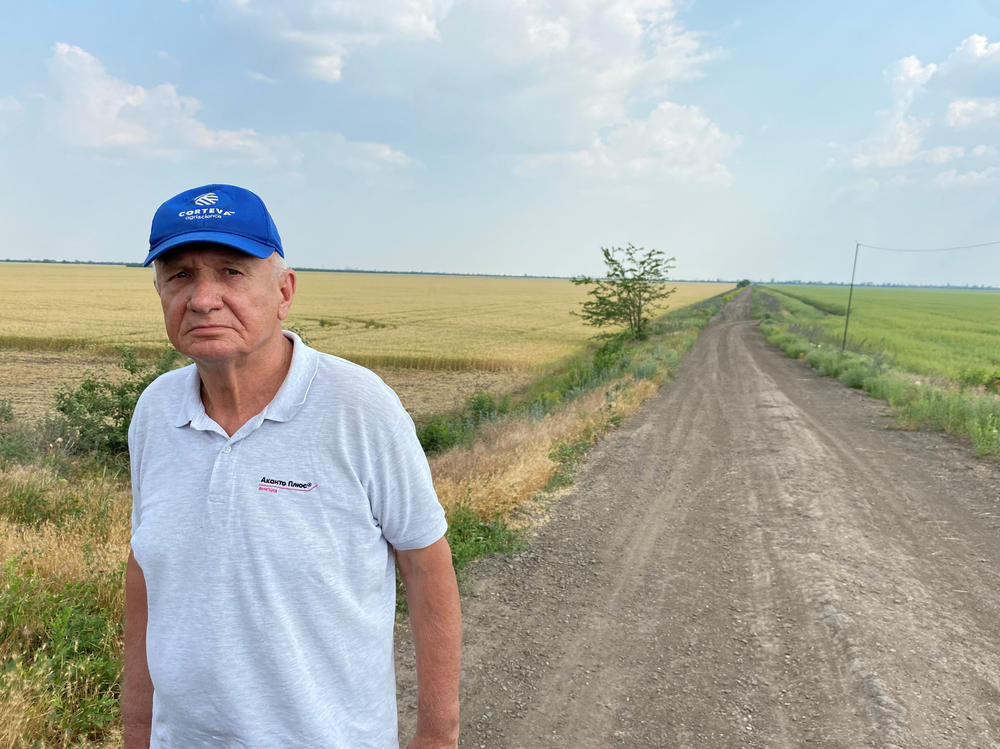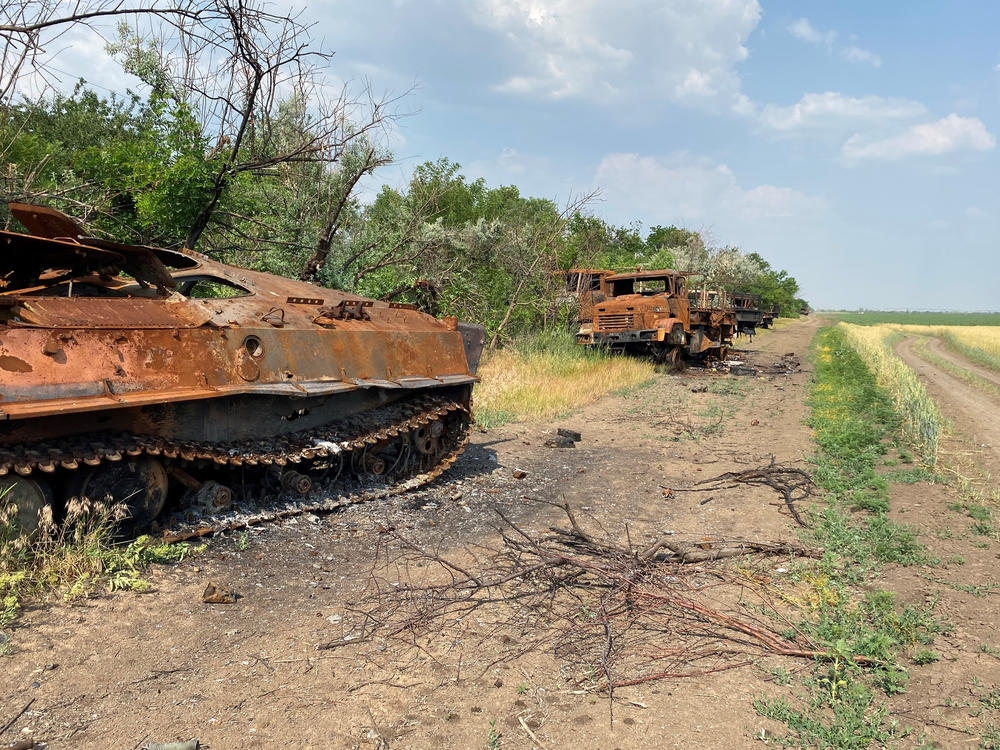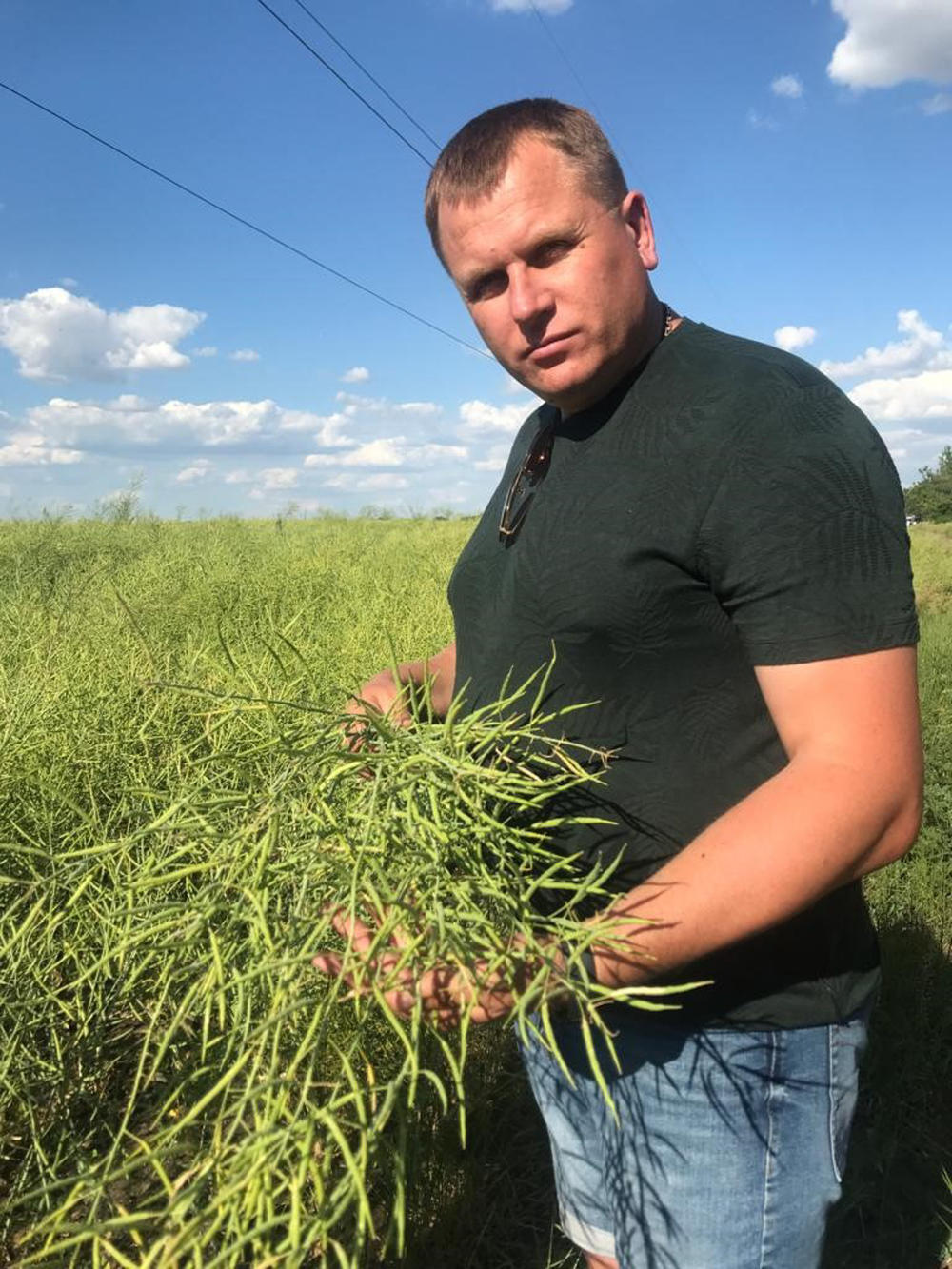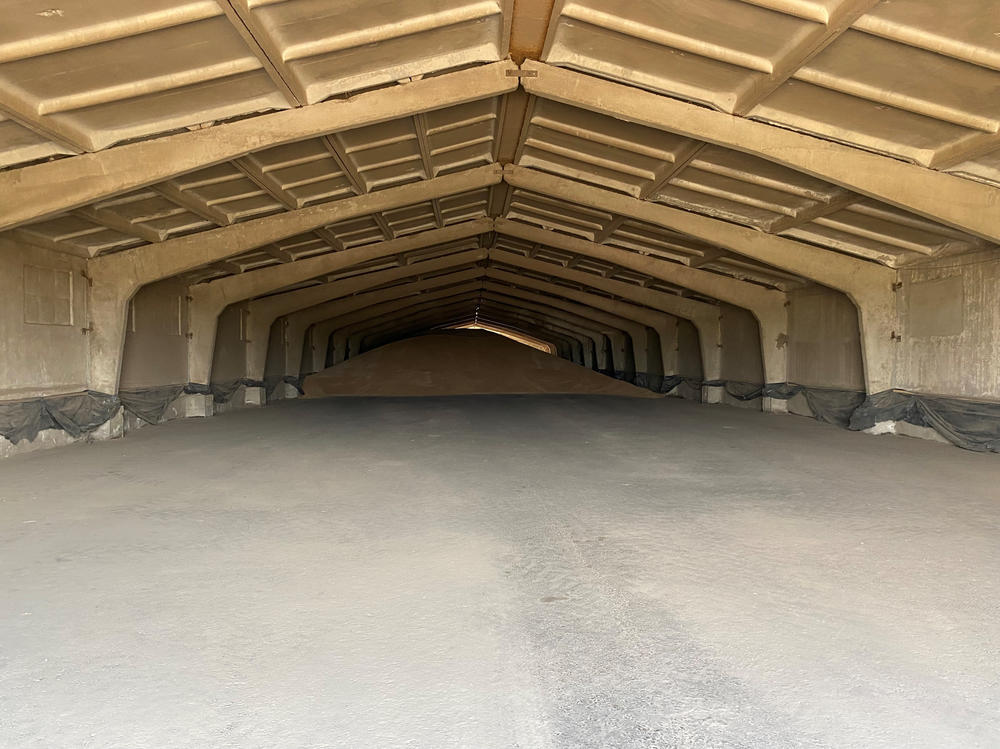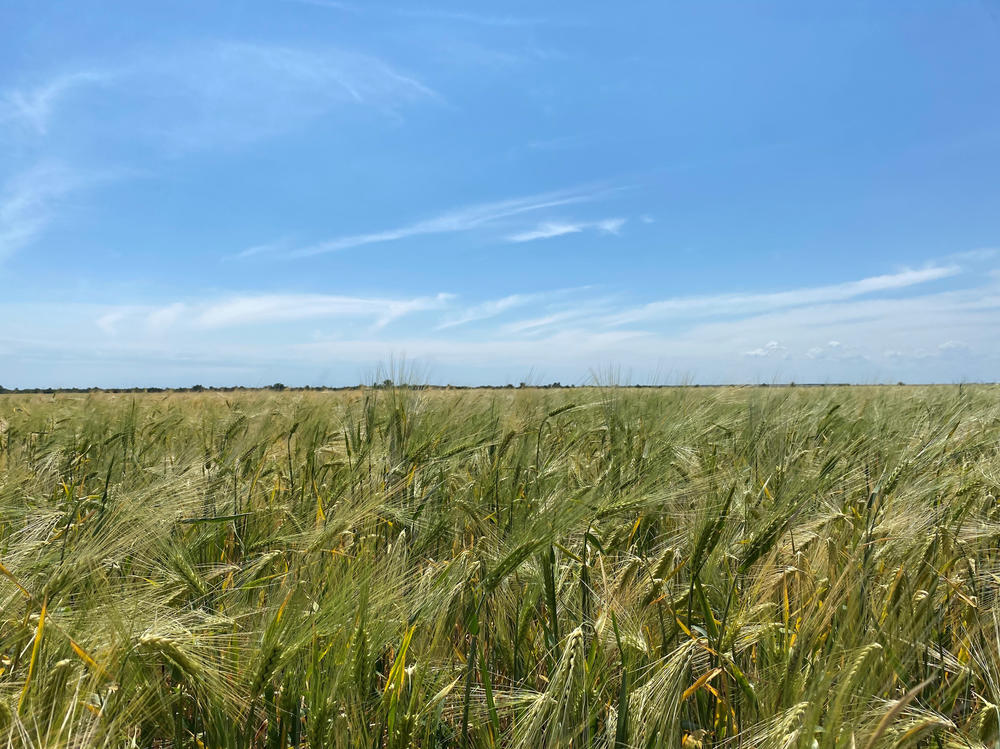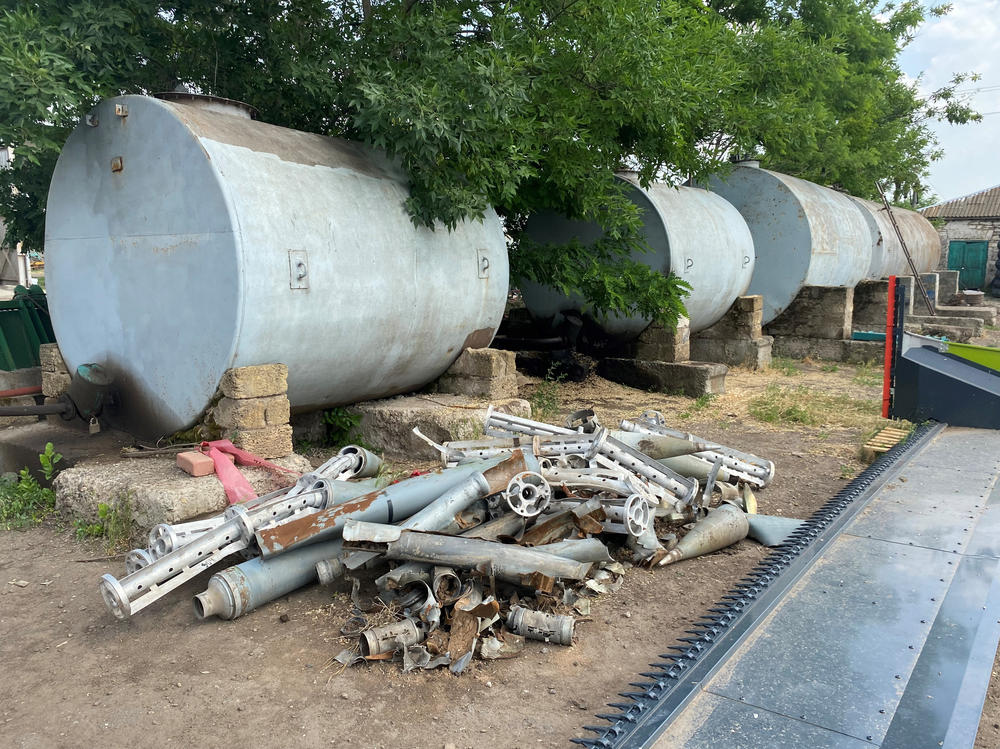Section Branding
Header Content
Ukraine's farmers face Russia's blockade and explosives on their lands this harvest
Primary Content
MYKOLAIV OBLAST, Ukraine — It only took Mykhailo Liubchenko homemade vodka to salvage some of his business.
Liubchenko, 72, farms wheat and sunflowers on the front lines of the Ukraine war's southern campaign. He says he paid off Russian soldiers with samogon — moonshine — so they wouldn't torch his fields or steal his equipment in the early weeks of the war in February.
"They were completely drunk," he says. "They didn't steal anything or destroy anything. The next day our Ukrainian forces pushed them back."
Months later, burned Russian tanks and vehicles still line the farm roads that square his several-thousand-acre plots. Red flags sprout above young sunflower shoots, alerting farmhands to unexploded ordnance left behind. A rocket sits perched on a tree trunk, in what looks like it was once a defensive military position.
"I have 1,000 hectares [2,471 acres] of winter wheat and barley, that I don't know how to harvest. I'll probably just light it on fire," he says. "If I let combines and tractors work, drivers could be blown up because there are still some shells."
Ukraine is considered a breadbasket of Europe and a major exporter of wheat, corn, sunflower and other food. But Russian warships and Ukrainian mines are blocking shipping lanes through the Black Sea. The United Nations warns the blockade will worsen world hunger, which leaves Ukrainian farmers in the middle of a local and global crisis — right as the year's harvest begins.
Negotiations fail to reach result
Attempts by the U.N., Turkey and other parties to negotiate with Russia to let exports ship out of Ukrainian waters have so far failed. Moscow offered to help if the West lifted some of its sanctions and Ukraine cleared its mines around the ports.
Ukraine has been left out of the discussions, but a senior Ukrainian official said it would participate soon and expects the conversations to become more serious in July.
Meanwhile, global food prices have hovered near record highs their rise, even as some commodities, including wheat and corn, have dipped since their peaks.
In another record, up to 323 million people are on the brink of starvation, the Group of Seven global economic leaders warned on Monday, saying that factors including COVID-19 and climate change contributed.
The war in Ukraine "is dramatically aggravating the hunger crisis; it has triggered disruptions of agricultural production, supply chains and trade that have driven world food and fertiliser prices to unprecedented levels for which Russia bears enormous responsibility," the group's statement reads.
European Union officials accuse Russia of using hunger as a weapon, calling its blockade of Ukraine's shipping ports a war crime. EU foreign affairs chief Josep Borrell has warned about "the risk of a great famine in the world, especially in Africa."
Exports trickle out
Before the war, Ukraine exported 5 million to 6 million tons of food per month — with more than 90% of it going through Black Sea ports. But in May, Ukraine exported just 1.8 million tons.
"There was a lot of vessels that were scheduled to arrive in Ukrainian ports that just did a U-turn in the Black Sea," after Russia's invasion, says Mark Nugent, senior dry bulk analyst at Braemar Shipping Services.
Last year, Ukraine exported $27.8 billion worth of agricultural goods. It shipped more than 20 million tons of wheat and other cereal grains — 10% of the world total for those commodities. Ukraine is also normally the top producer of sunflower seed, oil and meal, as well as a leading corn exporter.
Ukraine's Agriculture Ministry thinks the maximum amount of exports by land would top out at about 2.2 million tons per month.
These days, about half of Ukraine's food shipments are going to Poland, Romania and Hungary by rail, and much of the rest by trucks. For farmers, it's costlier to ship by road.
"Right now we're preparing our trucks and getting passports for our drivers who don't have them," says Oleksandr Tatarov, a farmer who grows rapeseed, wheat and barley near Bashtanka, Ukraine.
Trucking barley to the ports of Izmail and Reni in southern Ukraine "costs about 50%" of the price Tatarov earns, he tells NPR, as explosions can be heard in the distance.
He says he'll test a truck shipment to those ports, where they could be loaded on barges on the Danube River, but he's heard trucks have waited for weeks to unload.
Almost one-third of Tatarov's nearly 8,600 acres are under occupation or shelling. "We've pulled the curtain on those fields," he says.
The day before he meets NPR, one of his farm garages was hit by a Russian attack. A shell destroyed one of his four food storage facilities.
Running out of space
When the blockade began, Ukraine already had 23.5 million tons of grain and seed in storage, Prime Minister Denys Shmyhal said in June. That left Ukraine's storage capacity about a third full, excluding the silos that are located in Russian-occupied territories.
Now, the Agriculture Ministry anticipates running out of storage capacity by October, expecting a harvest of grains and seeds to be about 60 million tons — half of last year's.
"Part of our storage of facilities are in temporarily occupied territories, part of them were destroyed," Deputy Agriculture Minister Markiyan Dmytrasevych tells NPR. "We understand we'll face a deficit of grain storages. ... The deficit could be 10-15 million tons."
President Biden said the United States would help build temporary facilities in Poland.
Meanwhile, farmers like Tatarov will use massive silo bags to store as much as 200,000 tons of harvested grain and seeds in the fields. Other growers, including Vasily Khmilenko, are searching for bins to rent.
"I've never needed storage before," he says. "The port [in Odesa] is very close to us, so when we harvested, the trucks came straight to the field and took the grain."
Khmilenko says the harvested grain cannot sit in the field uncovered because rain would destroy it. He's negotiating with a company to store his entire yield, which he estimates to be between 400 and 500 tons.
He says he hopes they'll take some grain as payment.
Liubchenko says he has experience demining as a former military colonel. He points out a pile of ordnance he says he removed from his fields. But that was earlier in the season, when the plants were shorter. It would be too dangerous to do that now, he says, because the taller plants obstruct his view of the ground.
He says he'll store as much of his harvest as he can and wait for the blockade to end.
For Khmilenko, if he cannot sell this year, he says he'll be out about $70,000. "If we lose this it will be impossible to rebuild. I paid too much in this business to recover it," he says.
Khmilenko's farm is relatively far from the front lines, and he says he's confident Russian forces will not reach his land.
But the threat of shells, and potential fire from them, continues to haunt him. Russia has increased its shelling and missile attacks in the southern region in recent weeks, including attacks on food storage facilities in Mykolaiv and Odesa.
"The most important thing is that we de-blockade our seaport," Dmytrasevych says. "The only way to do that is to defeat the Russians. So we need weapons, weapons and weapons."
Copyright 2022 NPR. To see more, visit https://www.npr.org.
Bottom Content

